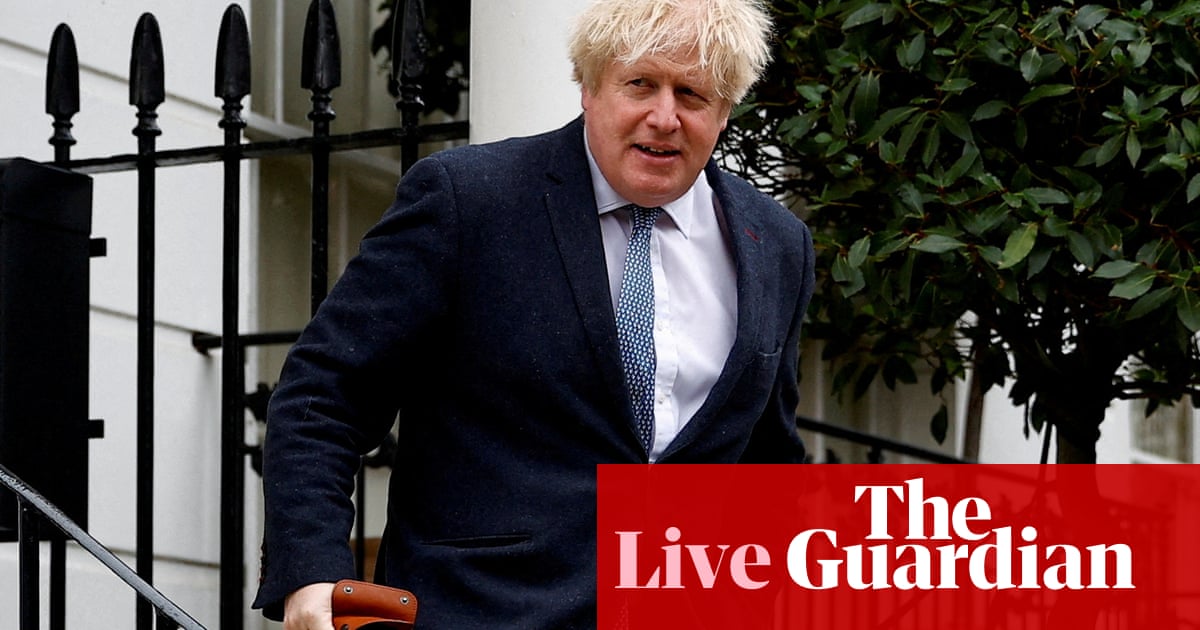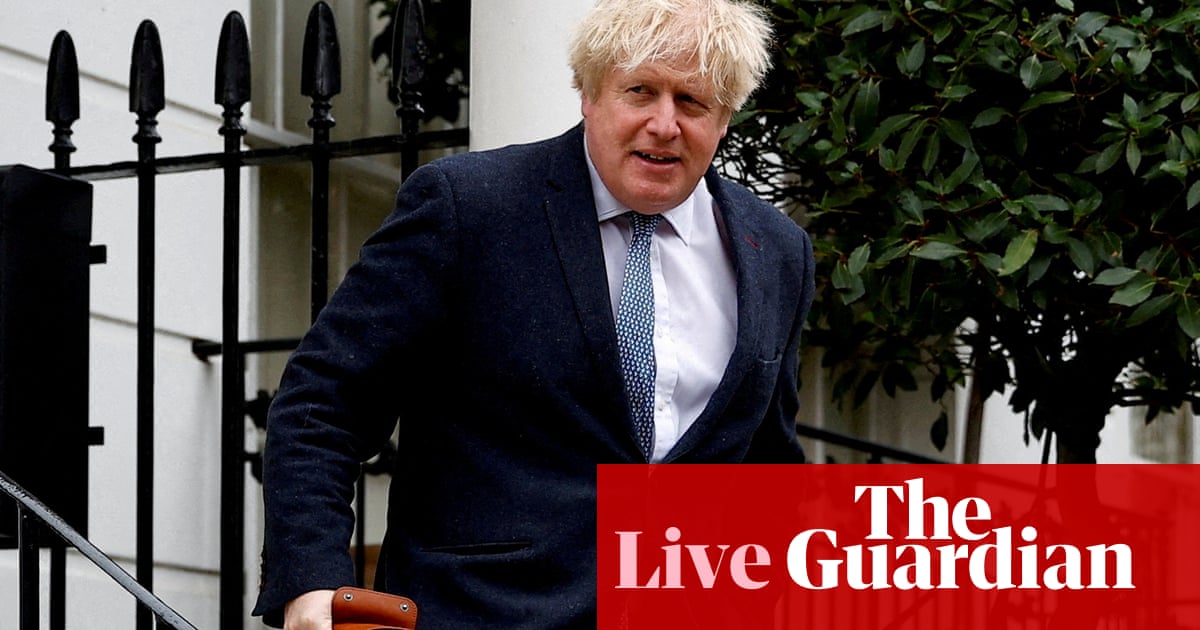
Boris Johnson "taken aback" by Partygate fine
Boris Johnson was “very surprised and taken aback” to get a fine for attending an event during lockdown.
The prime minister was speaking during a Q&A with Mumsnet. User questions were put to Johnson by the website’s co-founder Justine Roberts, which has been posted on YouTube.
In response to one question about his fine from the Metropolitan police, Johnson says:
I think if people look at the event in question it felt to me like a work event.
I was there for a very short period of time in the Cabinet Office, at my desk, and I was very very surprised and taken aback to get a fixed-penalty notice.
The first question asked of the prime minister is: “Why should we believe anything you say when it’s been proven you’re a habitual liar?”
Johnson responds:
Well, first of all, I don’t agree with the conclusion nor the premise of the question.
I think the best way to answer that is look at what I get on and deliver and what I say I’m going to deliver and that’s what I’m in politics to do, to try to make life better for people if I can.
I was elected at a particularly difficult time in politics, to get some tough things done.
Things then became, if anything, even more difficult because of the pandemic, but if you look at what we’re doing, we’re getting on and delivering.
He adds:
My answer about trust is people throw all sorts of accusations about all sorts of things ever since I drove around on a bus and they have all sorts of reasons for saying that.
But you’ve got to look at the record of what I deliver.
Here’s a roundup of key developments from the day:
Boris Johnson’s deputy has insisted the prime minister did not breach the ministerial code even though he was fined by police for attending a No 10 party in lockdown, as the government’s ethics chief reportedly threatened to quit over the scandal. Dominic Raab, the deputy prime minister and justice secretary, said on Wednesday that Johnson had only “unintentionally” and “inadvertently” broken the law.
The prime minister faces fresh criticism of his conduct over Partygate as the committee on standards in public life issues a statement raising questions about his commitment to uphholding the ministerial code. Members of the independent watchdog are understood to have been particularly irked by Johnson’s decision, announced last week, not to give his independent ethics adviser, Lord Geidt, the power to launch his own inquiries in future.
Boris Johnson was “very surprised and taken aback” to get a fine for attending an event during lockdown. He told Mumsnet: “I was there for a very short period of time in the Cabinet Office, at my desk, and I was very very surprised and taken aback to get a fixed-penalty notice.”
Simon Fell, the MP for Barrow, has become the latest MP to publicly question the prime minister’s position, saying an apology was “insufficient” after the damning details in Sue Gray’s Partygate report. Fell, who was elected to the “red wall’ seat in 2019 and was part of the “pork pie plot” of MPs who met to discuss their loss of faith in Johnson earlier in the year, stopped short of saying he had written a letter of no confidence in the PM.
Tory MPs including a junior minister are holding back from submitting letters of no confidence in Boris Johnson over fears their names will leak and they will face reprisals from the whips. Rebel Conservatives trying to orchestrate enough names to oust the prime minister say many MPs, particularly newer ones, are concerned about the privacy of the process.
Efforts to topple Boris Johnson are being co-ordinated by “one or two individuals” for reasons of “personal ambition”, Nadine Dorries has said. The culture secretary told BBC Radio 4’s World at One programme “the overwhelming number of Conservative MPs are fully behind” the prime minister and “absolutely back him”.
Boris Johnson’s unpopularity in Scotland is at a record high, according to a new poll for STV News. Ipsos Mori has found he has a popularity rating amongst Scottish voters of -71, with a large majority fearing they will be worse off if remains prime minister after the next election.
The shadow levelling up, housing and communities secretary, Lisa Nandy, has said “any government worth its salt would be moving heaven and earth to stop the misery and the chaos” unfolding at airports. She said: The government was warned all the way through the pandemic that the loss of skilled staff was going to create problems.”
Charities that support asylum seekers say they are documenting a number of suicide attempts among those threatened with being sent to Rwanda. Cases include a female Iranian asylum seeker who attempted suicide and told charity workers she took this action because she believed she faced being offshored to Rwanda.
Thanks so much for joining me today. I’ll be back again tomorrow.
Watchdog questions PM’s commitment to public standards
Boris Johnson faces fresh criticism of his conduct over Partygate as the committee on standards in public life issues a statement raising questions about his commitment to uphholding the ministerial code.
Members of the independent watchdog are understood to have been particularly irked by Johnson’s decision, announced last week, not to give his independent ethics adviser, Lord Geidt, the power to launch his own inquiries in future.
That was one of nine recommendations made by the committee earlier this year, of which Johnson has implemented only two – one of which was to allow ministers to escape resignation for minor infractions.
A source close to the committee said members were angered by what they saw as “cherrypicking” – and that its chair, Jonathan Evans, a former director general of MI5, was expected to express those concerns publicly.
Even before Partygate, Johnson’s government had been accused of undermining standards in public life, including by overruling the finding of Geidt’s predecessor, Alex Allan, that the home secretary, Priti Patel, had bullied staff, albeit inadvertently. Allan resigned in protest.
Geidt used his annual report, published on Tuesday, to pose what he called the “legitimate question” of whether Johnson had broken the ministerial code, in receiving a fixed-penalty notice for breaching lockdown rules. The code includes an “overarching duty” to comply with the law.
Geidt reportedly considered resigning over the fact that until Tuesday evening, Johnson had failed to make any statement setting out why he believed he had not broken the code. However, it is understood he now has no intention of stepping down.
The prime minister, who is the ultimate arbiter of the ministerial code, then published a letter in which he exonerated himself on several grounds, including the fact that he had apologised, and did not believe he was breaking the rules at the time.
He also stated that he believed the principles of good conduct in public life, which include selflessness and integrity, remained “the bedrock of standards in our country and in this administration”.
Johnson still faces an investigation by the House of Commons privileges committee over whether he lied to MPs, when repeatedly asserting that “all guidance was followed” in Downing Street.
The government should mitigate the cost of living crisis by rejoining the single market (Norway model), the senior Tory MP Tobias Ellwood has argued.
The former minister said that, with inflation soaring and the cost of living crisis growing, “more radical thinking is required if we are to energise our economy through these stormy waters” and ultimately hold on to power at the next general election.
In a comment piece for Politics Home, he writes:
As a recent YouGov poll indicates, this is not the Brexit most people imagined, with the majority believing Brexit has gone badly. There is appetite to make improvements – not U-turns but course corrections.
In a nutshell, all these challenges would disappear if we dare to advance our Brexit model by re-joining the EU single market (the Norway model). Leaving this aspect of the EU was not on the ballot paper, nor called for by either the prime minister or Nigel Farage during the 2016 referendum. There was, however, much discussion about returning to a ‘common market’, which is exactly what I propose.
Any model will have benefits and drawbacks. The single market means the free movement of goods, services, capital and people. It would see £7bn of paperwork and checks go, and boost our economy by restoring free trade to sectors demanding change.
Tory MPs hold back from move against Boris Johnson over leak fears
Tory MPs including a junior minister are holding back from submitting letters of no confidence in Boris Johnson over fears their names will leak and they will face reprisals from the whips.
Rebel Conservatives trying to orchestrate enough names to oust the prime minister say many MPs, particularly newer ones, are concerned about the privacy of the process.
They worry that the Tory whips will be spying outside the office of Sir Graham Brady, the 1922 Committee chair who gathers the letters, and do not trust emails not to be accidentally shared or viewed by staff who have access to the accounts.
Some senior Tories who are publicly opposed to Johnson have taken on the role of conduits carrying letters to Brady. One said they had offered to take letters to Brady’s parliamentary office on behalf of colleagues concerned about leaks, as there was a pervasive feeling of mistrust in the process among new MPs who had not been through the vote of no confidence in Theresa May.
They said MPs had not been prepared to email their letters because of concerns about others having access to their inboxes or computers, and they said they had repeatedly reassured colleagues that no letters had leaked from the challenge against May.
Another Conservative backbencher said the newer MPs in particular were worried about being targeted by the whips if they went public with having submitted letters, and if the coup attempt was ultimately unsuccessful.
A third MP said some of those who had gone public with their opposition to Johnson already felt as though their lives in parliament were being made difficult by the whips.
At least one minister has been wavering over putting in a letter over fears his name could come out and he would have to resign if the challenge is unsuccessful.
Who are the main contenders to replace Boris Johnson?
My colleague Rowena Mason has taken a look at Tory ministers jostling for top job with ratings out of 10 on their chances of success.
Boris Johnson’s future could be sealed as early as next week if 54 Tory MPs submit letters saying they have lost confidence in the prime minister, and 180 Conservative MPs then vote to oust him in a secret ballot.
But one of the factors making some MPs hesitant is the lack of an obvious successor. Here are the main contenders jostling for position with a rating out of 10 on their current chances of success, although MPs are taking seriously the idea that a wild card candidate could end up winning in the event of a contest.
Jessica Elgot has written a round-up of the MPs who want to get rid of Boris Johnson.
They come from different wings of the party, but in short they are William Wragg, Tobias Ellwood, Mark Harper, Andrew Bridgen, Alicia Kearns, Caroline Nokes, and Stephen Hammond.
More than 65,000 people have arrived in the UK under Ukraine visa schemes, government figures show.
As of Sunday, about 65,700 refugees had arrived, including 23,100 people under the family scheme, and 42,600 people under the Homes for Ukraine sponsorship scheme.
About 143,900 applications had been made for visas as of Monday, and 120,200 visas had been issued.
These include 46,000 applications under the family scheme, of which 40,300 visas have been granted, and 97,900 applications under the sponsorship scheme, of which 79,900 visas have been granted.
Sue Gray findings a "slap in the face", says Tory MP
Simon Fell, the MP for Barrow, has become the latest MP to publicly question the prime minister’s position, saying an apology was “insufficient” after the damning details in Sue Gray’s Partygate report.
Fell, who was elected to the “red wall’ seat in 2019 and was part of the “pork pie plot” of MPs who met to discuss their loss of faith in Johnson earlier in the year, stopped short of saying he had written a letter of no confidence in the PM.
“I’m left feeling angry and disappointed. It beggars belief that when the government was doing so much to help people during the pandemic, a rotten core with an unacceptable culture carried on regardless of the restrictions placed on the rest of us,” he wrote in a letter to constituents.
“To many of us, these findings are a slap in the face.
“The culture that Ms Gray’s report details is unforgivable and I certainly will not be defending it. There were no exceptions in the rules for the activities that took place, and there is no excuse whatsoever for them.
“As Ms Gray details, a corrosive culture and a failure in leadership allowed this to happen and apologising after the fact is insufficient ... Trust matters. And standards in public life go to the heart of maintaining it - once trust is lost, the whole house of cards is at risk of collapse.”
Fell’s letter makes it 45 MPs who have either submitted letters of no confidence or stated explicitly that they have lost faith in his leadership. Others from the 2019 cohort who have called for Johnson to go include Aaron Bell, Alicia Kearns, Elliott Colburn and Anthony Mangnall.
Charities that support asylum seekers say they are documenting a number of suicide attempts among those threatened with being sent to Rwanda.
Cases include a female Iranian asylum seeker who attempted suicide and told charity workers she took this action because she believed she faced being offshored to Rwanda. She was taken to hospital and survived.
A 40-year-old Yemeni asylum seeker made a video addressed to Boris Johnson and Priti Patel stating that after he arrived in the UK on 13 April and found out about Rwanda offshoring plans he had “no other choice but to kill myself”.
The prime minister has said that “more pragmatism” and “less theology” is needed to resolve the northern Ireland protocol.
In an interview with Mumsnet, Boris Johnson said:
I think that the protocol is certainly not functioning well. And the last thing we want to have is a border between Northern Ireland and Ireland, and that is simply not going to happen.
All that we’re trying to do is to get rid of some pretty pointless and bureaucratic checks on stuff that’s going from GB to Northern Ireland.
Now, I did the protocol, I negotiated it. The problem is that I thought that it would be implemented with common sense and pragmatism - because the ultimate arbiter of how to make it work, unfortunately, is the EU.
And I just think what is needed is more pragmatism and less theology, because at the moment what you’ve got is one community in Northern Ireland - the unionist/loyalist community - feeling that there’s a border down the Irish Sea, an east-west border, and that is inflaming their sentiment. They won’t go back into government in Northern Ireland unless we fix it.
So for me, the priority is to fix the protocol and get the Good Friday Agreement institutions up and running again. That’s what needs to happen.”
Efforts to topple Boris Johnson are being co-ordinated by “one or two individuals” for reasons of “personal ambition”, Nadine Dorries has said.
The culture secretary told BBC Radio 4’s World at One programme “the overwhelming number of Conservative MPs are fully behind” the prime minister and “absolutely back him”.
She said:
There is, obviously, I think probably led by one or two individuals, a campaign behind the scenes to try to attempt to remove the prime minister for individual reasons to do with personal ambition or other reasons.
Asked who was behind the campaign, she said she had “no idea” but there was “obviously a coordinated campaign”.
Dorries said Tory MPs calling for Johnson’s resignation are doing the opposition’s work for them.
She said:
All I would say to my colleagues is the electorate, the public, don’t vote for divided parties and I don’t think we want to do both Labour and the SNP’s work for them.
The people who most want to get rid of Boris Johnson are Keir Starmer and the SNP and I would just ask my colleagues to reflect on that and do we really want to do the opposition’s work and do we really believe the public will vote for a party that they think is divided.
Asked whether Johnson should echo John Major’s tactic of telling his party to “put up or shut up”, Dorries described this as an “indulgence”, adding:
John Major was not dealing with a war in Ukraine, there hadn’t been a Covid pandemic, times were not as turbulent as they are right now.












